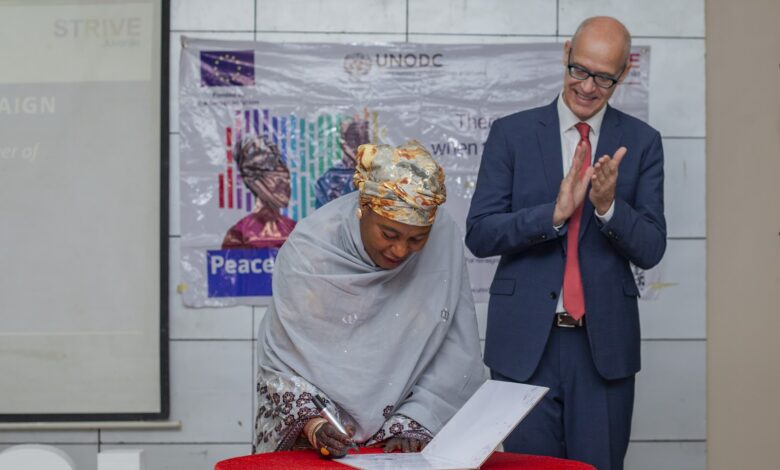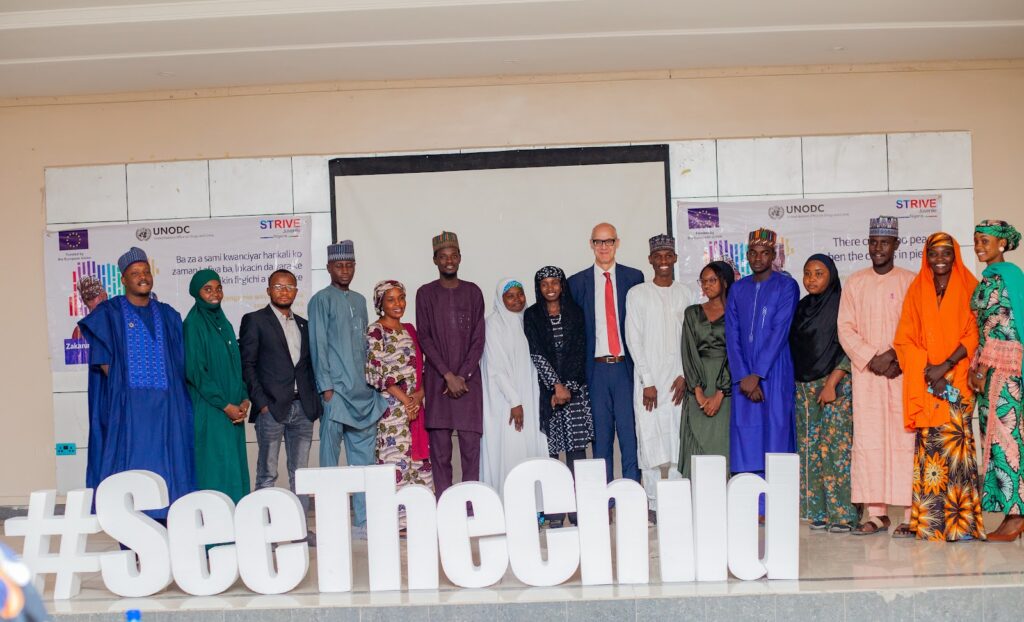UNODC Hands Over Youth-Based Community Dialogue Structures To Borno Gov’t
The United Nations Office on Drugs and Crime (UNODC) has handed over a youth-led Community Dialogue Structure to the Borno State Government. The project aims, among other things, to contribute to the prevention of recruitment of vulnerable children by armed groups.

The United Nations Office on Drugs and Crime (UNODC) in its efforts to strengthen reconciliation and reintegration pathways for “persons associated with non-state armed groups” and communities of reintegration for children in North East Nigeria, has formed the STRIVE Juvenile Project.
The project is expected to conduct a youth and community-led awareness-raising campaign in Borno State, to fuel community acceptance and reduce stigmatisation of reintegrated children in two targeted local government areas in Maiduguri and Jere.
Sixteen young peace champions undergo training in basic conflict mediation and dialogue. They actively collaborate with community leaders, women leaders, traditional leaders, opinion leaders, and teachers from Jere and Maiduguri. Their mission is to promote tolerance and acceptance for reintegrated children linked to armed groups, including those identified with terrorism.
According to the project officer Abba Ali Yarima Mustapha, the handing over of the Community Dialogue Structures (CDSs) is an unwavering commitment to ensuring the sustainability of the CDSs which have played a critical role in fostering peace, understanding, tolerance, and resilience between returnees and community members.
“We train 16 youth peace champions on how to engage communities through the use of animation, photography, and community dialogue,” said Abba.
Oliver Stolpe, the Country Representative for the UNODC in Nigeria, explained to HumAngle the project’s objective. Stolpe stated, “The prolonged psychosocial support aims to facilitate the full integration of children into their society, helping them overcome the traumatic experiences they have endured and ensuring they become truly integrated as productive members of society.”
The Borno State National Orientation Agency (NOA) serves as the Secretary to the dialogue structure and the Borno State Ministry of Women Affairs and Social Development as the co-secretary to the handed-over structure.
Since 2019, UNODC and the Government of Nigeria have worked together to address the phenomenon of children recruited and exploited by armed groups, including terrorist groups, through specialised capacity-building activities and a scoping mission conducted by a team of UNODC experts in January 2020.
With the Project STRIVE Juvenile, launched in Nigeria on 15 April 2021, UNODC and the Government of Nigeria have enhanced their cooperation in Preventing and Responding to Violence Against Children by Terrorist and Violent Extremist Groups.

The project also aims to contribute to the prevention of recruitment of vulnerable children and re-recruitment of those that have already been reintegrated into the communities, by building the resilience of key stakeholders, including youth groups, children, traditional leaders, religious leaders, women groups, People with Disabilities (PWDs), Almajiri (Traditional Qur’anic students), online users, and state and federal authorities within Maiduguri Metropolitan Council and Jere Local Government Areas.
Oliver Stolpe commended the commendable acceptance by community leaders of the youth-led dialogue and their pivotal role in reintegrating repentant Boko Haram members into society. He emphasised the sustainability of the project and announced a commitment of additional resources in collaboration with the Borno state government, aiming to expand the initiative to Adamawa and Yobe states.
“With over 140,000 people returning from Boko Haram or its territories, legitimate fears and concerns arise within the communities. Addressing these apprehensions necessitates community dialogues, a strategy leveraging youth peace champions to effectively overcome these concerns,” he said.
Support Our Journalism
There are millions of ordinary people affected by conflict in Africa whose stories are missing in the mainstream media. HumAngle is determined to tell those challenging and under-reported stories, hoping that the people impacted by these conflicts will find the safety and security they deserve.
To ensure that we continue to provide public service coverage, we have a small favour to ask you. We want you to be part of our journalistic endeavour by contributing a token to us.
Your donation will further promote a robust, free, and independent media.
Donate HereStay Closer To The Stories That Matter




